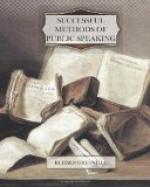Gladstone
Gladstone had by nature a musical and melodious voice, but through practise he developed an unusual range of compass and variety. He could sink it to a whisper and still be audible, while in open-air meetings he could easily make himself heard by thousands.
He was courteous, and even ceremonious, in his every-day meeting with men, so that it was entirely natural for him to be deferential and ingratiating in his public speaking. He is an excellent illustration of the value of cultivating in daily conversation and manner the qualities you desire to have in your public address.
John Quincy Adams
John Quincy Adams read two chapters from the Bible every morning, which accounted in large measure for his resourceful English style. He was fond of using the pen in daily composition, and constantly committed to paper the first thoughts which occurred to him upon any important subject.
Fox
The ambition of Fox was to become a great political orator and debater, in which at last he succeeded. His mental agility was manifest in his reply to an elector whom he had canvassed for a vote, and who offered him a halter instead. “Oh thank you,” said Fox, “I would not deprive you of what is evidently a family relic.”
His method was to take each argument of an opponent, and dispose of it in regular order. His passion was for argument, upon great or petty subjects. He availed himself of every opportunity to speak. “During five whole sessions,” he said, “I spoke every night but one; and I regret that I did not speak on that night, too.”
Theodore Parker
Theodore Parker always read his sermons aloud while writing them, in order to test their “speaking quality.” His opinion was that an impressive delivery depended particularly upon vigorous feeling, energetic thinking, and clearness of statement.




